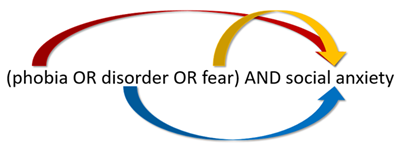3.8 Nesting Keywords
Nesting lets you combine multiple searches into a single search. It allows you to group similar concepts or keywords together within parentheses so you don’t have to perform multiple searches, using a new synonym each time. Combined with Boolean operators like AND and OR, nesting is an efficient and effective way to improve your keyword search results.
It can be helpful to think of this like order of operations in math, where using parentheses impacts the order in which an operation is performed. Similarly, Boolean operators have an order of operations. In a Boolean search NOT takes priority, followed by AND, and then OR. By using parenthesis you control which action the index applies first. Here are some examples:
sonic AND hedgehog AND protein NOT game
In the above example, the database will first remove any results that contain the word “game.” This should help eliminate any video or board game references. Finally, the database will search for records containing all three remaining search terms.
(phobia OR disorder OR fear) AND social anxiety

In this example, we want to search for phobia AND social anxiety, disorder AND social anxiety, or fear AND social anxiety. Using parentheses, we can perform all of these searches at once. Without using parentheses, this example would retrieve different results by grouping fear and social anxiety together first, and then searching for this grouped term OR phobia OR disorder, but not necessarily all three together. Because of this, many of your results would be missing the social anxiety element.
(cinema OR movies OR film) AND (french OR france) AND criticism
This final example combines two different sets of nested keywords. Similar to the example above, using nested terms with OR lets you group related concepts to control the order in which they are searched. In this case, we are looking for resources discussing criticism of French cinema. Because we know there are many ways to talk about cinema, we have included synonyms within the first set of parentheses. Similarly, we also know authors may use either French or France when talking about this topic. The reason we don’t have all of the Boolean ORs in the same set of parentheses is because they are not interchangeable topics — both are integral to our search. For this reason, we have included AND between the sets of parentheses.
Boolean operators and nesting let you make your keyword search as simple or as complex as you wish – just remember that Boolean AND narrows your search results, while Boolean OR broadens your results. The more ANDs you include, the fewer results you will retrieve.
Using Quotation Marks for Phrases
When you are searching for a specific phrase, you can put your terms within quotation marks to search for those words only as that exact phrase, and not the words separately or in any order.
Example: “journey to the center” – finds Journey to the Center of the Earth; Mandala: Journey to the Center; Centromeres: A Journey to the Center of the Chromosome, etc. In each case, you have found an exact match of your phrase, even if they may not all be exactly what you are looking for.
